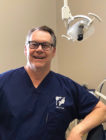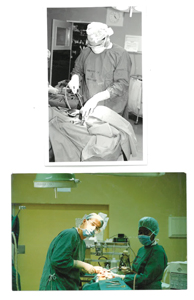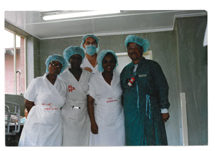In the 1990s, I initiated a resident exchange between our program at the University of Toronto and the same Oral & Maxillofacial Surgical program at the University of Witswatersrand in Johannesburg, South Africa (RSA). The registrar (resident) from their university (“Wits” for short) and I would switch posts for 3 months, performing the duties we would have normally performed in our own respective programs. Once the administration agreed to the plan, I obtained my visa from the South African Consulate (Apartheid was still in power!) and arranged a flight to Johannesburg to begin what I hoped would be a rewarding and exciting experience.
However, even my high expectations fell short of how fantastic and extraordinary this exchange was, both professionally and personally. In fact, it would prove to be a life changing experience both from a clinical skills and knowledge standpoint, and in consideration of the lifelong friendships that I developed.
The moment I arrived at Jan Smuts Airport, Johannesburg, and collected my luggage, I was met by the “Wits” registrar (Dr. Peter Tsakiris). We drove straight to Baragwanath Hospital, the hospital where I would spend the next 3 months, and without pre-amble, we gowned up for the operating theatre. Peter turned to me in the hallway to say, “Bruce, you take that operating theatre (indicating one of the doors) and I’ll work this one”! I asked “don’t I need paperwork or the South African Medical License I applied for first”, to which he responded, “ this is Africa, it will arrive eventually – let me know if you need any help with that broken mandible”, and he was gone!
Baragwanath Hospital (“Bara” to the initiated) is across from Soweto, outside of Johannesburg. It is the 3rd largest hospital in the world, with approximately 3,200 beds. For context, The Toronto General Hospital serving downtown Toronto, where I performed my surgical residency, has 417 patient beds. Approximately 70% of all admissions at “Bara” were emergencies, including more than 100 gunshot wounds per month. Accident, emergency and ambulance admission wards represented the busiest services, accounting for over 350 patients daily. Every year 150,000 inpatient and 500,000 outpatients are registered and treated. The Oral and Maxillofacial Surgery service would run several operating theatres carrying out up to 50 facial fracture repairs per week! Needless to say, for a 2nd year trainee eager to hone their skills and make a difference, this was “Lekker” (An Afrikaans word). The three months flew by, with many close friendships and professional associations made, along with a fantastic life experience. The down time was spent learning RSA’s fascinating history, exploring the country, and of course, visiting wild game preserves.
When I returned to Canada, I shared the details of my experience with my instructors and fellow residents. The following year, Dr Iain Nish, a good friend and co-resident, followed up and maintained the exchange, and had an equally fabulous and life changing experience. The registrar that came to Canada to replace Dr. Nish’s presence in our program was none other than Dr. Tsakiris who I had worked alongside in South Africa the year prior.
This past fall, Iain and I were fortunate enough to return to Africa. We volunteered to lecture at the University of Nambia Medical Dental School, and have been invited to return to assist in the curriculum development for their fledgling undergraduate oral surgery program. Following our adventures in Nambia, which included travelling through the length of the country, we flew on to Cape Town in order to present some of our work at the Tripartite Congress of Maxillofacial and Oral Surgeons from South Africa, Britain, and Australia/New Zealand. Attending the scientific meeting not only provided for some professional development, but also the opportunity to meet up with many of our old surgical friends and mentors from our training experience in RSA. Following the dissolution of Apartheid, many of the registrars from “Wits” were spread far and wide around the globe, and the scientific meeting brought many of them home, including Dr. Tsakiris who now lives and works at a hospital in Sydney, Australia. It was as if the past 28 years had past in the blink of an eye as we reminisced about wonderful shared experiences at “Bara” in the 90’s.
Looking back at my training and professional career, based on my experiences, I would strongly encourage any student, residents and practicing dentists/specialists to reach out through their university or volunteer organizations and participate in oral health volunteerism. The personal and professional development alone make it well worthwhile!
About the Editor
 Dr. Bruce R. Pynn is Oral Health’s editorial board member for Oral and Maxillofacial Surgery. He maintains a private practice in Thunder Bay, ON. He is an Associate Professor, North Ontario School of Medicine, Lakehead University, and Chief of Dentistry, Thunder Bay Regional Health Sciences Centre. He is also the Past President of the Ontario Society of Oral and Maxillofacial Surgery. He also served as President of the Ontario Society of Oral and Maxillofacial Surgery in 2017.
Dr. Bruce R. Pynn is Oral Health’s editorial board member for Oral and Maxillofacial Surgery. He maintains a private practice in Thunder Bay, ON. He is an Associate Professor, North Ontario School of Medicine, Lakehead University, and Chief of Dentistry, Thunder Bay Regional Health Sciences Centre. He is also the Past President of the Ontario Society of Oral and Maxillofacial Surgery. He also served as President of the Ontario Society of Oral and Maxillofacial Surgery in 2017.
To view the entire Oral Surgery 2020 issue of Oral Health, please click here.















